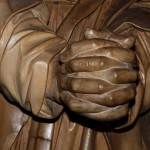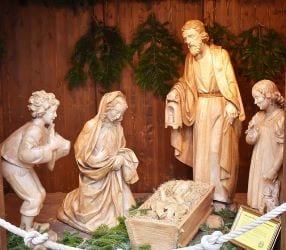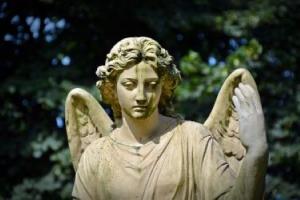In a courtroom recently, families of victims forgave the unimaginable crimes committed against them and their loved ones, and pleaded with a vicious murderer to repent and find God:
“You took something very precious away from me. I will never talk to her ever again. I will never be able to hold her again. But I forgive you. . . . You hurt me. You hurt a lot of people. May God forgive you. And I forgive you.”
“I forgive you and my family forgives you, but we would like you to take this opportunity to repent . . . confess, give your life to the one who matters the most . . . so that He can change it—can change your ways no matter what happens to you, and you will be OK. Do that and you will be better.”
“Every fiber in my body hurts, and I will never be the same. . . . May God have mercy on you.”
“Everyone’s plea for your soul is proof that they [the victims] lived in love and their legacies will live in love. So, hate won’t win. . . . I just want to thank the courts for making sure that hate doesn’t win.”
And a vicious murderer repented for his horrific crimes, expressing remorse and asking for God’s mercy, not just for himself but for his victims:
“You told us just how unbearable it was, this thing I put you through. . . . Now, I am sorry for the lives that I have taken. I ask Allah for his mercy for me and my brother and my family. . . . I pray to Allah to show his mercy to the deceased in this bombing.”
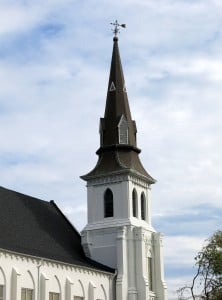
As you may have guessed by now, I am referring to the heartfelt expressions of forgiveness and mercy offered on June 19 by the victims’ families in the deadly shooting at the Mother Emanuel AME Church in Charleston, South Carolina . . . and the stunning statement of repentance on June 24, offered at his sentencing to death by Dzhokhar Tsarnaev, who, along with his older brother, set bombs to explode at the finish line of the Boston Marathon in April 2013.
Perhaps it seems strange to link these two atrocities (a shooting rampage in a church and a bombing of a sporting event) in this way, and to see something of a bond between the victims’ families in Charleston and the Boston Marathon Bomber. To see a common bond between those brave families’ pleas that their loved ones’ killer turn his life over to Jesus—and Tsarnaev’s quiet expression of remorse and prayer to Allah that mercy be shown not just to himself, or to his brother, or to his family, but also to his victims. On the surface, about the only thing these two events would appear to have in common is that they were both occasions of domestic terrorism.
More understandable perhaps, from a human perspective, were the reactions of the original recipients of the pleas for repentance and the expression of remorse. Dylann Roof, the shooter at Mother Emanuel AME is reported to have “stood expressionless” while the families in the Charleston courtroom made their statements to him. In Boston, reactions to Tsarnaev’s statement were mixed. Some were clearly taken aback. At least one pulled out a tissue. Others spoke bitterly:
“Sure, I heard him. . . . I don’t care what he says. It’s dead man walking as far as I’m concerned.”
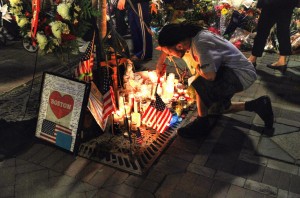
We cannot judge those who were harmed in the Boston Marathon bombing for not being able to immediately accept Tsarnaev’s statement of remorse. I can only imagine that the pain they suffered still needs time to heal. Perhaps at some later point, when the cameras have been turned off and they are alone with their thoughts, they will begin to heal spiritually, as well as physically and mentally. Perhaps years down the road, they might be able to offer the forgiveness Tsarnaev so clearly sought.
What we can do is to reflect on the mysteriousness of grace, and how it doesn’t always flow in predictable ways. A couple of years ago, after Pope Benedict XVI stunned the world by announcing his retirement from the papacy, I wrote a blog post titled When God Says, “I Have Another Idea.” I wrote then about a convert who was talking about his conversion story to a priest who was a member of a religious order:
This convert had attended a famous Protestant seminary in the U.S., one which had been seeing a surprising number of its alumni enter the Catholic Church. When the convert was telling his conversion story to a religious-order priest, he mentioned to the priest he had been to Protestant seminary. The priest asked him the name of the school. “Oh, you probably have never heard of it,” the convert said, and then named the school. The priest smiled and said he knew the school very well. He used to teach there.
The convert was stunned, so the priest explained. The property on which the Protestant seminary now operated used to be a Catholic boys’ school run by this priest’s religious order. For many years, the priests who ran the school prayed for vocations to the priesthood from among the boys they taught. Then the school had to be closed and the property was sold to the Protestant group that started the convert’s seminary.
The priests’ prayers for vocations had produced unexpected fruit. Their prayers had been for vocations to the priesthood among the boys they taught. God answered with vocations to the Church among the students of the Protestant seminary.
The mystics of the Church have long compared God’s grace to water. Water is the universal solvent, able to wear down anything to which it is exposed for a long enough period of time. Even when it doesn’t immediately dissolve those objects in its immediate path, such as rocks, water will shear off hard surfaces and can dissolve other objects that are more susceptible to its power.
I can only conclude by recounting my own reaction when I read the news of Tsarnaev’s statement.
I cannot remember the last time I heard someone being sentenced to death speak so movingly about his remorse and desire for mercy. Much more common is the very lack of expression Dylann Roof presented to his victims’ families in Charleston.
Dzhokhar Tsarnaev committed unimaginable evils, and must pay a just penalty for those crimes (though, in my opinion, death is not a just penalty in this case). But it is obvious that God is not done acting in his life, and that providence spared him from being killed along with his brother. Providence allowed him the chance for grace to keep softening his heart to the point that he was able to seek God’s mercy not just for himself but for those he harmed. I’d like to believe that the words of mercy and forgiveness spoken by the families in Charleston were a means of grace that God directed to someone who was ready to accept and respond to the actual grace to repent and to seek mercy.
May Dzhokhar Tsarnaev find in Allah (the one, true God) the mercy he may not receive from his fellow men—and here I do not dare to include Tsarnaev’s victims, only of those who were not directly harmed in Boston but remain unmoved by and hardened against his statement—many of whom no doubt consider themselves better human beings than he is. I hope against hope though that Tsarnaev will find some measure of human mercy. Mercy would not be mercy if he deserved it.
Lord, have mercy.
(Image credits: Mother Emanuel AME Church, Charleston, Wikimedia Commons. Memorial to the victims of the Boston Marathon Bombing in 2013, Boston, Wikimedia Commons. No endorsement of this text should be assumed or inferred.)
(Title credit: Elizabeth Scalia)

